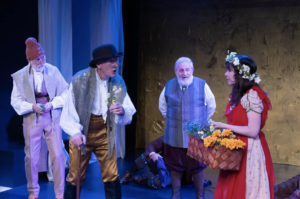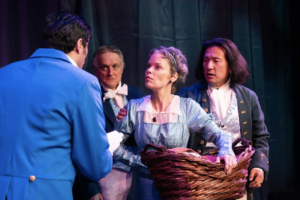By Robert St. Martin

Los Angeles, CA (The Hollywood Times) 2/12/24 – This was the opening weekend of a production of William Shakespeare’s The Winter’s Tale at the Antaeus Theatre in Glendale. This fine staging of one of Shakespeare’s late romances is a curious mixture of near tragedy in an intense psychological drama that is resolved in comic form in the last two acts of the play. The play has been intermittently popular, revived in productions in various forms and adaptations by some of the leading theatre practitioners and most recently in this one directed by Elizabeth Swain, fresh from Antaeus’ award-winning 2022 production of Shakespeare’s Hamlet.
The plot is a bit complex because most productions require a huge cast, but Swain managed to pull off this production with just fourteen actors and almost all playing double roles. Even Shakespeare with his pendant for doubling of roles on stage, needed sixteen actors to stage The Winter’s Tale. Swain brings her vast knowledge of the Shakespeare canon to tackling the timely question, “How do you forgive the unforgivable?”


When Leontes (Adam J. Smith), King of Sicilia, falsely accuses his wife of an affair with his best friend Polixenes (Ned Mockel), the King of Bohemia who is visiting him, he sets into motion a series of events that catapult two kingdoms into disarray in William Shakespeare’s sweeping romance of passion and forgiveness. Polixenes is visiting the kingdom of Sicily and is enjoying catching up with his old friend Leontes. After nine months, Polixenes yearns to return to his own kingdom to tend to affairs and see his young son. Leontes cannot persuade Polixenes to stay longer, and decides to send his wife, Queen Hermione (Kaci Hamilton), to try to convince him.


Hermione agrees and with three short speeches is successful. Leontes is surprised that Hermione could convince Polixenes so easily, and so he begins to suspect that his pregnant wife has been having an affair with the other king. Leontes orders Camillo (Geoffrey Wade), a Sicilian lord, to poison Polixenes. Camillo instead warns Polixenes and they both flee to Bohemia. Furious at their escape, Leontes now publicly accuses his wife of infidelity and declares that the child she is bearing must be Polixenes’ bastard. He throws her in prison, over the protests of his nobles, and sends two of his lords, Cleomenes and Dion, to the Oracle at Delphos for confirmation of his suspicions. Leontes proves to be an Othello who is his own Iago with his own diseased sexual imagination.

Meanwhile the queen Hermione gives birth to a girl while in prison, and her loyal friend Paulina (Ann Nobel) takes the baby to the king, in the hopes that the sight of the child will soften his heart. He grows angrier, however, and orders Paulina’s husband, Lord Antigonus (Brian Kim McCormick), to take the child and abandon it in a desolate place. Cleomenes and Dion return from Delphos with word from the Oracle and find Hermione on trial, asserting her innocence. The Oracle states categorically that Hermione and Polixenes are innocent, that Camillo is an honest man, and that Leontes will have no heir until his lost daughter is found.

Leontes refuses to believe the oracle, but soon learns that his son, Mamillius (played by Sabrina J. Liu), has died of a wasting sickness brought on by the accusations against his mother. Hermione falls in a swoon and is carried away by Paulina, who subsequently reports the queen’s death to her heartbroken and repentant husband Leontes. Leontes vows to spend the rest of his days atoning for the loss of his son, his abandoned daughter, and his queen.
Antigonus, meanwhile, abandons the baby on the coast of Bohemia, reporting that Hermione appeared to him in a dream and bade him name the girl Perdita. He leaves a fardel (a bundle) by the baby containing gold and other trinkets which suggest that the baby is of noble blood. A violent storm suddenly appears, wrecking the ship on which Antigonus arrived. He wishes to take pity on the child but is chased away in one of Shakespeare’s most famous stage directions: “Exit, pursued by a bear.” Yes, we see a bear behind the curtain chasing Antigonus on stage. Perdita is rescued by an old shepherd (Paul Eiding) and his silly son (Conlan Ledwith). And so, ends Act 3 of this seemingly dark set of tragic events.

After a well-deserved break for the audience, the play resumed in Act 4 with the passage of sixteen years in time – as explained by the allegorical figure of Time (played by Sabrina J. Liu). Camillo, now in the service of Polixenes, begs the Bohemian king to allow him to return to Sicilia. Polixenes refuses and reports to Camillo that his son, Prince Florizel (played by Peter Mendoza), has fallen in love with a lowly shepherd girl, Perdita (Shannon Lee Clair). He suggests to Camillo that they disguise themselves and attend the sheep-shearing feast where Florizel and Perdita will be betrothed.
Polixenes and Camillo watch the festivities in disguised, as Florizel (Peter Mendoz) (under the guise of a shepherd named Doricles) and Perdita are betrothed. Polixenes tears off his disguise and intervenes, threatening the Old Shepherd and Perdita with torture and death and ordering his son never to see the shepherd’s daughter again. Camillo, still longing for his native land, schemes to send Florizel and Perdita to Sicily, so that Polixenes will bring him along when he pursues them. The lovers take ship for Sicily, as do the two shepherds.

In Sicily, Leontes is still in mourning for his dead wife Hermione and his lost son. Leontes’ advisors suggest that he should remarry to have an heir. Paulina (Ann Noble), however, convinces the king to remain unmarried forever since no woman can match the greatness of his lost Hermione. Florizel and Perdita arrive and are greeted effusively by Leontes. Florizel pretends to be on a diplomatic mission from his father, but his cover is blown when Polixenes and Camillo, too, arrive in Sicilia.
The meeting and reconciliation of the kings and princes is reported by gentlemen of the Sicilian court: How the Old Shepherd raised actually raised the foundling Perdita, how Antigonus met his end, how Leontes was overjoyed at being reunited with his daughter, and how he begged Polixenes for forgiveness. Thus, the favorite theme of Shakespeare’s late plays, that of forgiveness, dominates Act 5. Leontes, Polixenes, Camillo, Florizel and Perdita then go to Paulina’s house in the country, where a statue of Hermione has been recently finished. The sight of his wife’s form makes Leontes distraught, but then, to everyone’s amazement, the statue shows signs of vitality. It is Hermione, miraculously restored to life – or simply having lived in seclusion with Paulina for the last sixteen years. Despite this happy ending typical of Shakespeare’s comedies and romances, the impression of the unjust death of young prince Mamillius (son of Leontes) lingers to the end.
As Elizabeth Swain explained in her director’s notes, “Having actors play dual roles reflected the play’s many dualities. First, we have the two locations of courtly Sicilia and rustic Bohemia and their contrasting characters. The question I sought to answer was how do we present their polarities in a way that slowly reveals their connectedness?” This seems to work well in Swain’s production of the play.
There is, of course, the larger themes of jealousy and forgiveness, death and rebirth, suffering and redemption in The Winter’s Tale. This is where the allegorical figure of Time factors in so importantly at the start of Act 4, when tragedy seems overturned, and comedy re-emerges with a vision of hope. As Swain states it, “Only the passage of time brings about a form of resolution, with unexpected reunions and, ultimately joyful healing.” How else might a statue of Hermione seems to come to life at the play’s end? As Paulina explains, “it is required / You do awake your faith.”
Swain’s production with Regency period costume works well, as does the bare stage with only curtains to hide and reveal as the play progresses. The strength of this production is the clarity of the text as presented by the actors and that makes it all the more accessible to a modern-day audience. The plays first performed in 1611 and perhaps the last play written by the Bard before his retirement to Stratford-upon-Avon.
This Antaeus Theatre production of The Winter’s Tale runs February 4 through March 11. General admission tickets are $40. The Antaeus Theatre is located at Kiki & David Gindler Performing Arts Center, 110 East Broadway, in Glendale, CA. For tickets, call the Box Office at (818) 506-1983. Or go to the website: www.antaeus.org.





